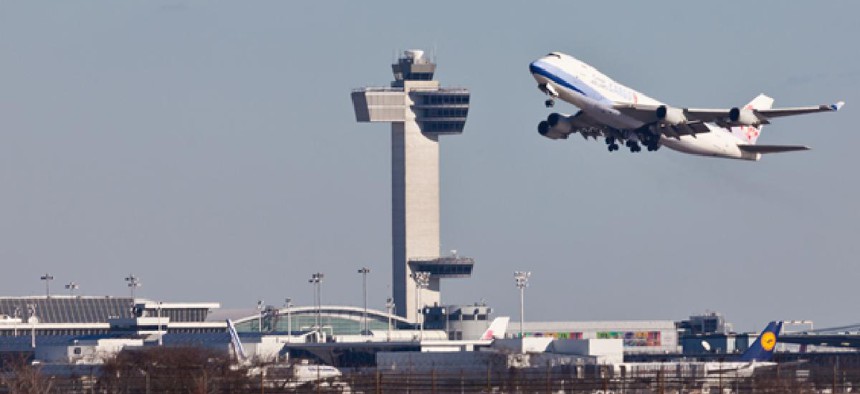Will the FAA’s Air Traffic Control Go Nonprofit?

The Federal Aviation Administration (FAA) could become a nonprofit organization by the end of the summer, if Congressman Bill Shuster (R-Pa.) has his way.
Shuster, chairman of the House Transportation and Infrastructure Committee, announced that he will introduce a bill later this month to remove the FAA’s air traffic control (ATC) systems from the Department of Transportation by privatizing it as a nonprofit corporation, he told the Aero Club of Washington on Monday.
In outlining his solution to the FAA’s problem, Shuster told the audience, “I believe we need to establish a federally chartered, fully independent, not-for-profit corporation to operate and modernize our ATC services.”
Shuster explained that the change is needed because red tape, bureaucracy, and quibbling in Congress have created an FAA that is unable to modernize, innovate, or fund itself.
The FAA is tasked with directing the 87,000 flights aloft in the United States every day—or 5,000 flights at any given moment. The complex orchestration of takeoffs, landings, ascents, descents and inevitable delays is managed by the FAA’s air traffic control branch, or ATC. It’s this ATC element that Shuster hopes to break off as a nonprofit entity.
This approach has already been tried in many other countries with success, Shuster said. Fifty countries in the last 20 years have separated out their ATC service, he noted. In those cases, he continued, the change resulted in fewer delays, more reliable service, a modernized ATC system and an unchanged or improved safety record.
Earlier this month, Reuters reported that Nick Callo, president of US airline trade group Airlines for America, said the US air traffic control system may soon be modeled on the Canadian system, known as NAV Canada. The new nonprofit service wouldn’t be a “cookie cutter” image of NAV Canada, Callo told Reuters, ”but that's the best-operated system out there.”
On Monday, Airlines for America endorsed Shuster’s call for a nonprofit ATC, calling it “the best way to achieve the efficiencies customers deserve and the accountability stakeholders need while continuing to set the gold standard for safety around the world.”
A nonprofit ATC service would have important structural differences from how today’s federally-run FAA operates.
Critics cite several concerns, noting that a nonprofit service would be governed by a private board, potentially made up of airlines, airport operators and unions who could increase fees, change procedures and choose whether or not to modernize their services.
Rep. Peter DeFazio (D-Ore.), as ranking member of the House Transportation and Infrastructure Committee, is perhaps the most senior critic of the proposal.
“I have a number of serious concerns about the constitutionality, the national security implications and the logistical challenges of separating the system,” DeFazio said.
A Congressional Research Service report—commissioned by DeFazio and published last month—highlighted the potential legal trouble with spinning off the FAA’s ATC service. The report, which based its analysis on the legal framework used to establish NAV Canada, concluded that “establishing a private, non-profit ATC Corporation to provide air traffic control services may be unconstitutional.”
“We must exercise extreme caution moving forward with any major changes to our air traffic control system,” DeFazio said. “Any plan to change from the current system must undergo extensive scrutiny.”
Shuster spoke to some of those concerns in his speech.
“Creation of this corporation would naturally be carried out within the bounds of the Constitution,” he said. “Those users and the public interest will be fairly represented, and steps will be taken to prevent any conflicts of interest, or domination of the board by any one group.”
Since Shuster has not yet released a copy of the bill’s text, many key players have held off on any final judgment. Though few argue with the need to fix the FAA.
NEXT STORY: Keep On REAPing Rewards
